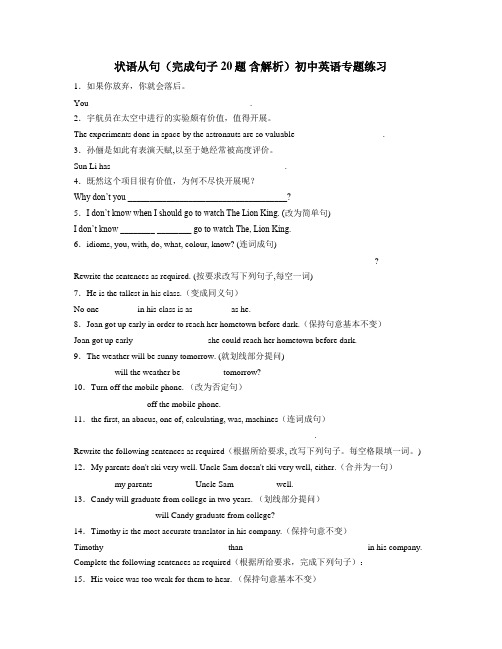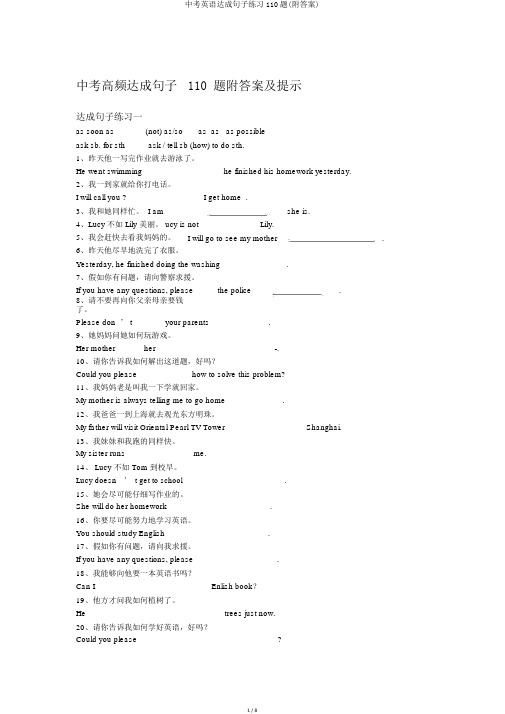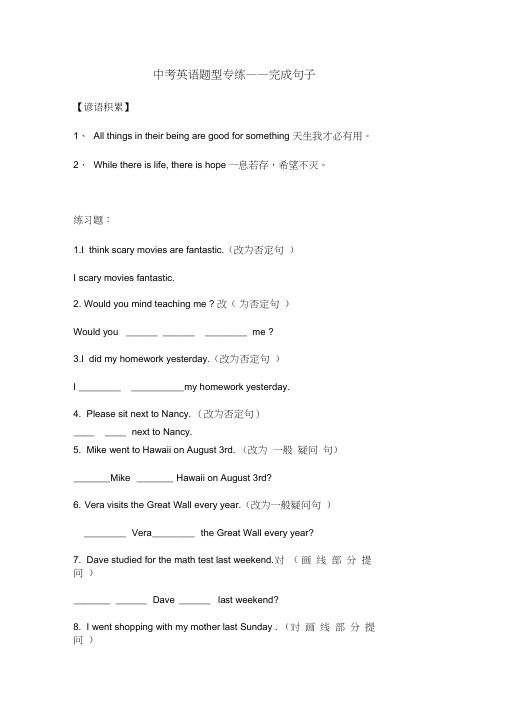英语完成句子 练习题
状语从句(完成句子 20题 含解析)初中英语专题练习 (1)

状语从句(完成句子 20题含解析)初中英语专题练习1.如果你放弃,你就会落后。
You _____________________________________.2.宇航员在太空中进行的实验颇有价值,值得开展。
The experiments done in space by the astronauts are so valuable ____________________.3.孙俪是如此有表演天赋,以至于她经常被高度评价。
Sun Li has ________________________________________.4.既然这个项目很有价值,为何不尽快开展呢?Why don’t you _____________________________________?5.I don’t know when I should go to watch The Lion King. (改为简单句)I don’t know ________ ________ go to watch The, Lion King.6.idioms, you, with, do, what, colour, know? (连词成句)______________________________________________________________________?Rewrite the sentences as required. (按要求改写下列句子,每空一词)7.He is the tallest in his class.(变成同义句)No one ________ in his class is as ________ as he.8.Joan got up early in order to reach her hometown before dark.(保持句意基本不变)Joan got up early ________ ________ she could reach her hometown before dark.9.The weather will be sunny tomorrow. (就划线部分提问)_________ will the weather be _________ tomorrow?10.Turn off the mobile phone. (改为否定句)________ ________ off the mobile phone.11.the first, an abacus, one of, calculating, was, machines(连词成句)________________________________________________________.Rewrite the following sentences as required(根据所给要求, 改写下列句子。
人教版七年级英语上册期末复习【完成句子 】专项练习题(含答案)

人教版七年级英语上册期末复习【完成句子】专项练习题I. 根据汉语意思,完成英语句子,每空一词。
1.Eric±学总是迟到。
Eric ______________________________ s chool.2.张雅找到了你的学生卡,你可以跟她要。
Zhang Ya found your ID card. You can ______________________________ .3.Coco是我的宠物狗,她也在我的全家福中。
Coco is my pet dog. She is ______________________________ , too.4.我们卖的所有物品的价格都很优惠。
We sell all our things _______________________________ .5.Tim和我在同一所学校上学。
Tim and I ______________________________________ .6.Frank周日要上一个小时的钢琴课。
Frank has a piano lesson _______________________ on Sundays.7.四双袜子仅需三美元。
Socks are only ______________________________________ .8.我妹妹通常在七点吃完晚饭,在那之后她做作业。
My sister usually _______________________ 7: 00 p. m. _______________ she does her homework. II.根据括号内的要求完成下列各题,每空一词(含缩略形式)。
1.I don't have much free time this week.(改为同义句)______________ this week.2.How much is this sweater? (改为同义句)______________________________ this sweater?3.That's my teacher.(改为复数形式)______________ my _______ .4.一Are these Jane's notebooks?(补全否定答语)—No, _______________ .5.I'm tidy. My sister isn9t tidy.(合并为一句)I'm tidy, ______________________________ .6.Alice has two lessons in the afternoon.(改为一般疑问句)_______ A lice ________ t wo lessons in the afternoon?7.Our Sports Day is on May 20th.(对划线部分提问)______________ your Sports Day?8.Alan doesn't want these shoes because they're too old.(对划线部分提问)m.根据______ these shoes? 片、提示词语及句末标点完成对话。
中考英语完成句子练习110题(附答案)

中考高频达成句子110 题附答案及提示达成句子练习一as soon as (not) as/so as as as possibleask sb. for sth ask / tell sb (how) to do sth.1、昨天他一写完作业就去游泳了。
He went swimming __________________he finished his homework yesterday.2、我一到家就给你打电话。
I will call you ?_________________ I get home_.3、我和她同样忙。
I am _________ ____ she is.4、Lucy 不如 Lily 美丽。
ucy is not _____________ Lily.5、我会赶快去看我妈妈的。
I will go to see my mother__ _ .6、昨天他尽早地洗完了衣服。
Yesterday, he finished doing the washing ______________ .7、假如你有问题,请向警察求援。
If you have any questions, please _____the police____ ___.8、请不要再向你父亲母亲要钱了。
Please don ’ t _______your parents _____________.9、她妈妈问她如何玩游戏。
Her mother ______her___________________________-.10、请你告诉我如何解出这道题,好吗?Could you please ____________how to solve this problem?11、我妈妈老是叫我一下学就回家。
My mother is always telling me to go home_____________.12、我爸爸一到上海就去观光东方明珠。
八下英语人教版完成句子练习题

八下英语人教版完成句子练习题Unit1 姓名分数1.After learning for a long time,we (需要足够的时间休息)。
2.(虽然她躺下了) she couldn’t go to sleep.3.The doctor (给他量体温) if he had a fever.4.You can (用同样的方式来完成那项工作)。
5.This bus doesn’t go to the train station,I’m afraid you will(在图书馆下车)and take the A52.6.(出乎我们的意料),the US warship broke into the South ChinaSea again on September 30th,2018.7.Mom,I’ll (马上打扫我的房间).8.(别怕惹麻烦),we should help the old man.9.He (不假思索的同意和我们一起去).10.Don’t (没有再三考虑不要冒险).11.John (应该待在家里)and do his homework.12.He that he doesn’t need.(他不应该买他不需要的东西).13.Don’t worry,we are (长大了能照顾我们自己).(enough)14.Junk food?(孩子们应该吃太多的垃圾食品吗?(too)15.The tourists (现在应该在北京了).16.Did you (量你的体温了吗) last night?17.He (跌倒了,伤到了右膝盖).18.(多亏了你的帮助),I passed the exam.19.If you want to protect your eyes,you need to (远离电脑休息一下).20.The teacher came into the classroom and (问我们发生了什么事情).(happen)21.Alice looks unhappy,I wonder (她发生了什么事).22.Frank (打中了头) by a basketball yesterday.23.I told her (用绷带包扎他的膝盖).24.The doctor told her to put her head down (因为他留鼻血了).25.If you just (只用水冲洗苹果),they’re not clean enough.(run)26.Did you (把水用完了吗)?(run)27.(我的钱花完了) so I had to find another part-time job.28.He (刚才从房间里出来了) just now.29.He (掌管着) a big company(公司).30.We won’t (放弃尽力实现我们的梦想).(try)31.---- (你怎么了)?-----I have a cold.32.It doesn’t sound like (发烧了).33.My brother (昨晚上胃痛).34.You (应该休息几天).35.Someone (撞头了) just now.(get)36.I saw a child (正躺在路边) just now.37.?(你们准备好冒险了吗?)38.The man (同意切除它).(cut)Unit 2 姓名分数1.she than that one.(想出了一个比那个更好的主意)(come)2.(不要忘记给我打电话),when you get there.(call)3.The teacher (给我们分发了一些礼物).(out)4.Nobody (照顾那些可怜的孩子们).(care)5.I really (想帮你解决困难).(help)6.They arrived in Xiangyang (同时).7.I know my dream (将来有一天会实现).8.I got (满足感),when I saw the look of joy on my mother’s face.9.Cristiano Ronaldo(罗纳尔多)became a soccer player (在13岁的时候).10.Lily the lead role in the movie.(将参加这部电影主角的选拔).(try)11.My mother (让我扫地).12.Please water.(关掉淋浴为了节约用水)13.It’s difficult (解决这个问题).14.The teacher has (老师有些重要的事儿要告诉你们).(tell)15.We (同意去游泳).(agree)16.She for their after-school programs.(她希望召集五个人作为他们课外项目的自愿者).17.They decided (在学校周围张贴标语,分发广告).18.Why don’t you ?(你为什么不去参加篮球队的选拔呢?)19.The volunteers are trying to (想办法使这些生病的孩子们振作起来).20.We (把会议推迟到明天).(till)21.Aron (将不再玩电脑游戏).(any)22.Fred (很像他父亲),they’re both outgoing.(take)23.My father (现在正忙着修理他的自行车)(fix).24.Lucy is (和她的妈妈在某些方面相似).(similar)25.I decided the children’s home.(把我的自行车捐给儿童之家)(give)26.We want to (创建一个组织) to help disabled people.27.The accident to his life. (对他的生活产生了很大的影响)28.I enter a good university.(能进入一所好的大学使我很幸运)(lucky)29.The children tomorrow’s party.(对明天的聚会感到很兴奋)(excited)30.Mr.Li (使得我们学习英语更容易).(make)31.I (在闲暇时间当一名自愿者)to help the people in need.32.I would like to around our city.(帮忙做一些事情)(help)33.She (善于讲故事).(strong)34.He food .(对分发食物的想法很兴奋)35.I’m (周末有空帮忙).(free)36.He said that he (能够解决这个问题).(able)37.What parents do often their children.(会对孩子产生影响)(difference)38.Nothing can (没有什么能让我放弃我的梦想).(make)39.Anna made a plan (独自旅行).(oneself)40.The singer began to learn to sing (在5岁时).Unit 3 姓名分数1.My mother (要求我整理床铺) every morning.(ask)2.The boss (随时都可能出去).(may)3.Can I (搭便车吗)?(get)4.You should (学会叠衣服).(learn)5.Could you please (不要在外面待到很晚好吗)?(stay)6.His mother (总是很晚才下班回家).(time)7.Could you please (遛遛狗) after school?(take)8.I do my homework (每天一回到家就做作业).(as)9.The man (扔下箱子走开了).(down)10.John doesn’t like vegetables, (他妹妹也不喜欢).(neither)11.Tomorrow?(明天你能和我一起去看电影吗)12.-----Mom, (我能出去一会儿吗?)------Yes,you can.13.We in the past.(过去可以在河里游泳)14.(那个男孩可能是) John.15.You (可以给他写信) to say sorry.(write)16.He (他从我这借了本故事书) yesterday.(from)17.I hate to do chores, (我的妹妹也是).(do)18.I’ll finish my homework (在你帮我洗餐具的时候).(while)19.,Liu Chang?(你愿意带一顶帐篷来吗,刘畅)(bring)20.Please !(帮我倒下垃圾).(take)21.May I (借用你的字典吗)? mine is left at home.(borrow)22.It’s a good habit (起床后整理床铺).(make)23.Please remember to (扫完地后要倒垃圾).(take)24.Mary (邀请我到他家吃晚餐) last Saturday.(invite)25.Let’s buy some !(饮料和小吃吧)26.They (给我们提供了美味的食物).27.just give them money.(仅仅给他们钱是不够的)28.There is the floor everyday.(没必要每天扫地)(need)29.Linda works hard (是为了赶上其他人).30.(我们种的树越多),the less air pollution there will be.31.I think (孩子们做些家务是必要的).32.It’s their homework.(把所有作业花在作业上对孩子们来说不公平)33.You should (遛狗).34.Could you please (把那些旧衣服带出去吗)?35.(孩子们越早学会独立),the better it is for their future.36.Our parents we need. (尽力为我们提供我们需要的一切)37.(做家务可以帮助培养)children’s independence.38.(那两个女孩都不擅长) swimming.(neither)39.All of us should (尽自己的职责来保护) environment.40.so early.(他们没有必要那么早离开).(leave)Unit 4 姓名分数1.my parents don’t________________________________________(允许我和朋友闲逛)2.Bob ________________________________(和他的朋友打了一架) last week.3.I _______________________________________(发现我的哥哥翻看)my diaries just now.4.My mom is ________________________________(正在和我的奶奶通电话)(talk)5.You should speak ________________________________________________what you said.(你应该说慢点,以便他能理解你说的)(so)6.Why not ________________________ your parents?(你为什么不与你的父母和睦相处)7.Please ________________________________(请向我解释如何解答)the math problem.8.Lucy stays at home and watches TV ________________________(而不是闲逛)on weekends.9.I ________________________________Jim on Saturday evening.(拒绝了和Jim一起去看电影)10.Do you ________________________________(当你独自在家时你会感到孤独吗?)11.I’m ________________________at school.(担心我在学校的学习成绩)(worry)12.My cousin ________________________________(借我的东西不归还)(without)13.Do your parents _________________________________on weekends?(介意你周末玩电脑游戏吗?)14.I hope you can ________________________________(解决这个问题)15.The boy ________________________(直到他妈妈回来他才睡觉)(until)16.Now parents ________________________________________________________________(在孩子的学习上给他们过多的压力)(pressure)17.I think it’s difficult ________________________________(我认为小商店很难与大超市竞争)18.On weekends,Alice likes ______________________________________(独处而不是和朋友闲逛)19.Life shouldn’t_____ _____________(只是成绩),free time activities are important ,too. (about)20.As students, we should________________________________________________________(互相帮助来取得更好的成绩)21.________________________________(你为什么删去) the articles?22.I like ________________________________(各种各样的美食)23.Don’t________________________________________________others’ all the time.(不要总是拿你的孩子与别人孩子做比较)24.I think _____________________________________________(太多的压力对孩子们的成长不好)25.In some families,________________________________________________________(竞争从孩子很小的时候就开始了,并且持续到孩子长大)26.________________________________________your best friends?(你为什么不和你最好的朋友分担你的问题呢?)27.Perhaps parents should ________________________________________________what they like.(允许他们的孩子做他们喜欢的事情)28.His problem is that he ________________________________________(不能与他的同班同学和睦相处)29.________________________________________(不要给我太多压力),I’m a little nervous.30.________________________(依我看),it’s important for kids to play sports after school.31.He ________________________________(还在生我的气)32.The problem is ________________________________________(太难而解决不了)33.When you ______________________________(借别人东西时),you must return them on time.34.You ________________________________(应该向他解释)that you don’t mind his watching TVall the time.Unit 5 姓名分数1.kate (正忙于做)the housework.2.Why didn’t (你的闹钟为什么没有响)3.Thanks (谢谢你帮我捡起我的钢笔)4.I (正在等你)at that time.5.He (暴风雨来临时他正在洗澡)the rainstorm.6.The girl is she’s a bird.(如此的快乐以至于她感觉自己像一只鸟)7.Check your homework carefully (确保没有错误)8.We should never (在困难时期我们绝不放弃)9.The heavy rain began (猛烈地敲打着) the windows.10.I fall asleep when (吵闹声逐渐消失时)11.Mom was doing chores(当我正在为数学考试而学习的时候)12.He said it’s an interesti ng place here, my friends and I(就立刻跑过来四处看看)(have)13.When we got to the place of the accident,I found the car (因为撞到树上而严重变形了)14.The traffic has to (由于大雪车辆不得不在结冰的路面上慢慢移动)15.What was Jenny doing ?(在上周日上午九点)16.I remember (离开时关门了),it’s open now.17.They (正在拆除那栋旧房子) when I walked by.18.The date (对他有着特殊的意义).19.red(剩余的苹果是红的).20.A student (正默默地站在那里) at this time yesterday.21.The event (发生在一个寒冷的晚上).22.The phone rang (当他在洗澡时).23.I (我正在前往学校的路上) when it began to rain.24.(当我听到这个消息时),I was reading in the classroom.25.This event is (对我很重要) because it changed my life.26.He was (太兴奋了而无法睡眠) last night.27.The interview just took ten minutes, but it (感觉像几个小时)28.What were they doing ?(地震的时候).29.You should stand up (当老师喊你名字时).30.The river (每年春天河水都要上涨).Unit6 姓名分数1.It’s very that thing.(你做那件事是很愚蠢的)2.you work hard.(只要你努力任何事情都是可能的)3.The shirt is .(有点小)4.Playing sports is (一个保持健康的好方法)5.There are many sides to a story, so we(对它有不同的看法)6.He became famous (他的第一本书出版后,他就出名了)7.The people after hard work.(经过辛苦的工作人们将他们的家乡变成了一座美丽的城市)/doc/b914192332.html,st year (我第一次去了上海)9.Two minutes ago,the girl(把你的书藏在了门后)10.T hey for a while.(休息了一会儿,他们继续开车)11.(从前),people here lived a happy life.12.T hey (去年结婚了)13.I(爱上了这座城市),as soon as I got to Changsha.14.M ike was (如此的伤心以至于忍不住哭了)15.the passage last month.(上个月,他花了很长时间才写完)16.Y ou can see (沿途你可以看见许多美丽的花)17.S ome children (在月光下做游戏)18.T hey in one month.(他们计划一个月内完成工作)19.T he little girl near the mountain.(把我们领到了大山附近的一栋房屋)20.Y ou must tomorrow.(你明天一醒来就必须起床)21.T hey themselves.(他们制定了一个计划拯救自己)22.I’m very sorry for too long.(对不起让你久等了)23.H e him.(他尽力让那个女孩相信他)24.T he little girl was (如此的高兴以至于忘了)what her mother said.25.T he teacher will be angry (如果他不准时到)26.T he young man (足够勇敢抓住了)the thief.27.H is mother (直到天黑才回来)28.this is ! (这是多么奇怪的一栋房子啊)29.A s soon as we saw the photo, we (忍不住笑了)30.H e wanted to be a hero who kept fighting and(永不放弃来帮助弱者)31.T hey will build a bridge over the river (而不是买一条船)32.T he students was so selfish that she(把所有的东西都据为己有)33.H e cannot turn himself into a person(除非他能隐藏自己的尾巴)Unit7 姓名分数1.(据我所知),nobody is as heavy as him.2.The room is about 30 (面积约30平方米).3.china (在世界上拥有最多的人口).4.Children, on the table.(桌子上的东西随便吃).5.The lake (大约200米深).6.Open the window and (呼吸些新鲜空气吧).7.(尽管危险),they still chose to keep on going.8.We shouldn’t (放弃尽力实现我们的梦想).9.We must know what to do (面对困难时).10.Sometime humans can be (比自然力更强大).11.The school (招收外国学生).(take)12.Your room is (和我的一样大).13.My apple is (比你的大得多).14.This is (最有趣的电影)that I have ever seen.15.(一个主要的原因就是) is that I didn’t remember these words.16.He because it was too dark(因为天太黑他走路时撞到一颗树).17.The little boy (绊倒了,右膝盖伤得很严重).18.The old man (死于车祸).19.There are 30 students (大约有30个学生在教室里读书).(or)20.People (过去常常砍伐树木来盖) their houses.21.In cold winter, lack of food.(许多野生动物可能因为缺乏食物而死亡)22.Some wild animals (正处于危险中).23.We should being killed.(保护鲸免被捕杀)24.(关于鲸的一个有趣的事实是) Whales isthat some whales can sing songs.25.I think teachers should teach the children(了解拯救环境的重要性)the environment.26.The mountain (大约1800米高).27.Your room is almost (面积几乎和我的一样大).28.A panda (比猫重许多倍).29.This is (我国最深的湖泊).30.(请随意挑选) Some toys ,children.31.Do you know that China is (是世界上最古老的国家之一).32.Qomolangma is (比世界上的任何一座山都要高).33.There are now fewer than 2000 pandas (生活在剩余的森林中)(remain)34.She weighed only (她出生时只有2千克).35.Smoking is (吸烟有害健康,你必须把它戒掉).Unit8 姓名分数1.our trip (预计在三天后)。
初中英语题型专练——完成句子(句型转换有答案)

中考英语题型专练——完成句子【谚语积累】1、All things in their being are good for something 天生我才必有用。
2、While there is life, there is hope一息若存,希望不灭。
练习题:1.I think scary movies are fantastic.(改为否定句)I scary movies fantastic.2. Would you mind teaching me ? 改(为否定句)Would you ______ ______ ________ me ?3.I did my homework yesterday.(改为否定句)I ________ __________ m y homework yesterday.4. Please sit next to Nancy. (改为否定句)____ ____ next to Nancy.5. Mike went to Hawaii on August 3rd. (改为一般疑问句)_______ M ike _______ Hawaii on August 3rd?6. Vera visits the Great Wall every year.(改为一般疑问句)________ Vera ________ the Great Wall every year?7. Dave studied for the math test last weekend.对(画线部分提问)_______ ______ Dave ______ last weekend?8. I went shopping with my mother last Sunday . (对画线部分提问)_______ _______ you go shopping with your mother?9.I am going to be a volleyball player when I grow up. (对画线部分提问) ______ y ou going to be when you grow up?10.She went to New York on vacation.(就划线部分提问)____ ______ she go on vacation?11.I don ' t like this movie because it is meaningl对es画s.(线部分提问)you like this movie?12.He wants to watch a game show 对.(画线部分提问)he want to be?13.I don ' t mind the comed对ies画.(线部分提问)__ __ __ the comedies.14. You can 't play soccer in the hallwa改ys为.(祈使句)soccer in the hallways.15. You can ' t be late next tim改e 为. (否定祈使句)_______ _________ late next time .16. Michael saw a movie last night.(用tomorrow 改写)Michael _________ ________ a movie tomorrow.17. The students are listening very carefully(. 改为感叹句)________ _______ the students are listening!18. The students had great fun in the park改.(为同义句)The students _____ ____ in the park.19. My uncle bought me a bike.(改为同义句)My uncle __________ a bike __________ me.20. How do you like your new job? (改为同义句)_______ ________ __________ __________ _______ your new job?21. Could you please do me a favor ? 同(义句)Could you please ____ ______ _____ ______ ?22. I 'll try my best to finish it同. (义句)I ' ll ____ _____ t o finish it .23. I 'm sorry that I lost your book同.义(句)I ' m sorry ____________ your book .24. With his mother ' s help , he become a w同ri义ter句. ()With ___ ___ _____ his mother , he became a writer .25. We are sure we will win the football game next time . 同(义句)We are sure _____ ________ the football game next time .26. We were late for school because it snowed heavily.改(为同义句)We were late for school ______ _____ the heavy snow27. He likes cycling better than rowing.(同义句)He __________ cycling ________ rowing.28. Come in and sit down, please.(同义句)Come in and ________ a ____________ ,please.29. Could you please not speak loudly?(同义句)Would you mind ________ ________ l oudly?30. He ' s very sorry for his words(. 同义句)He' s very sorry for ________ _______ ________ .31. We didn ' t watch. TVWe played soccer instead(. 合并成一句)We played soccer _________ ________ __________ T.V32. 如果你想成为好学生,请遵守规则。
过去进行时(完成句子 25题 含解析)初中英语专题练习

过去进行时(完成句子 25题含解析)初中英语专题练习一、完成句子(共25题)1.当我爸爸回家的时候,我正在写作业。
I____________ my homework__________ my father came back home.2.She was doing some reading when the teacher came in.(一般问句及回答)_________ she _________ _________ reading when the teacher came in?No, she _________ .3.I was reading in the library at the time of the rainstorm.(改为一般疑问句)________ ________ ________ in the library at the time of the rainstorm?4.While I was having a shower, you called me. (用when替换)I ________ ________ a shower ________ you called me.5.He was riding to school. He met an old man. (用when把两句连成—句)_________________________________________________________________________________ 6.The students were cleaning their classroom at ten this morning.(改为否定句)________________________________________________________________________________ 7.Tom was waiting for a bus at 8 yesterday morning. (改为一般疑问句)______________________________________________8.What did you do last weekend?(用at eight last night 改写句子)What ________ you ________ at eight last night?9.We were flying kites in the park at four yesterday afternoon.(对画线部分提问)________________________________________________________________________________ 10.Were they having a discussion about the water problem in the meeting room? (作肯定回答)_________________________________________________________________________________ 11.当天开始下大雨时,我正在等公交车。
初中英语完成句子专项练习11-20组(含参考答案)

初中英语完成句子专项练习(二)十一、1.学生们决定为那些流浪猫和狗筹一些钱。
The students decided to _____________for the stray cats and dogs.2.我们前面的那位女士是我们的英语老师。
她对我们很有耐心。
The lady in front of us is our English teacher. She________________us.3.这件大衣对我来说太小了。
我能试一下那件紫色的吗?This coat is too small for me. Can I___________the purple one?4.我的朋友说我和我妈妈很相似,特别是说话的方式。
My friend says I___________________ my mother, especially the way I talk.5.我们必须遵守交通规则,当交通灯变红的时候不要穿行。
We must follow the traffic rules and don’t go cross when the traffic lights______________.十二、1.每年这片森林都会有大量的树木被人们砍伐。
Every year a lot of trees _____________by people in this forest.2.她在放学回家的路上看见一个棕色的钱包。
She saw a brown purse _____________home from school.3.据统计,到目前为止,西安已有三百万人是来自外省的。
According to statistics, Xi'an has _____________people from other provinces so far.4.如果你继续一直看电视,你就不能按时完成今天的作业了。
If you ____________ TV, you won't be able to finish today's homework on time.5.当你身处困境时,真正的朋友都愿意伸出援手帮你。
中考英语完成句子练习题集锦1000题

中考英语完成句子练习题集锦1000题中考英语完成句子练习题集锦1000题1.现在,每年很多动物和植物正在灭绝。
Now many animals and plant_______ _______ _______ every year.2.他喜欢每天出去散散步。
He likes_______ _______ _______ _______ every day.3.他的书法和我弟弟的一样好。
His handwriting is_______ _______ _______ my brother’s.4.动物白天通常隐藏才树丛里。
The animals usually hide among the trees_______ _______ _______.5.足够的睡眠对我们很重要。
Having enough sleep_______ _______ _______ us.6.我弟弟吃掉了剩下的饼干。
My brother ate_______ _______ _______the cookies.7.菜虫向我挑战赛跑。
Caichong_______ _______ _______ a race.8.我正盼望着你来呢。
I am_______ _______ _______ your coming.9.亚运会将在广州举行,我们为此而自豪。
The Asian Games will be held in Guangzhou, we ______ all ______ ____ it.10.父母都不允许我们在考试前看电视。
We ____ _____ ______ _____ watch TV before the exams by our parents.11.今天天气多么好啊!_______ ________ _________ it is!12.我觉得和长者谈话事很有帮助的。
I think _______ ________ to _______ ________ the old people.13.我们当中没有人去过非洲。
- 1、下载文档前请自行甄别文档内容的完整性,平台不提供额外的编辑、内容补充、找答案等附加服务。
- 2、"仅部分预览"的文档,不可在线预览部分如存在完整性等问题,可反馈申请退款(可完整预览的文档不适用该条件!)。
- 3、如文档侵犯您的权益,请联系客服反馈,我们会尽快为您处理(人工客服工作时间:9:00-18:30)。
完成句子:1.她英语说的很好,我想她能和那些美国朋友相处得好。
She ____ English very well ,I think she can be _____ with those American kids.2.让他和我们一起做游戏吧!Let him and ______ ________ with us !3.多谢你为我播放音乐。
Thank you for _____ ______ for me.4.汉堡是我的最爱。
Hamburgers ______ my _________ .5.让我们去请求老师帮忙好吗?Shall we ________ teachers ________ help ?6.咱们先去踢足球吧。
________ play football ________ .7.格林先生现在拍完了那部电影。
Mr. Green ______ ______ the movie .8.跟着我,否则你会迷路的。
Follow me, or you will _________ _________.9.那些食物尝起来美味可口。
The food _______ ________.10.小明有个好习惯,每天上床睡觉前刷牙。
Xiaoming has a good habit, to he _______ _______ before going to bed .11.别吵!要播天气预报了。
Be quiet ! It’s ______ _______ the weather report .12.太无聊了。
你能说点激动人心的事吗?It’s boring . Can you tell me _______ ________?13.在真正的冰上滑冰我有些困难。
I have some ________ ________ on the real rice .14.过去他在家里养鸡。
He ______ _____ in the past .15.那个小孩在睡觉,别把他吵醒了。
The child is sleeping , don’t _________ him ________.16.汤姆看上去是一个非常聪明的小男孩。
Tom _______ ________ be a very clever boy.17.因为那个坏天气,航班拖延了。
The flight was put off _______ _______ the bad weather .18.小明感觉他是个超人。
Xiaoming _______ ______ he was a superman .19.莉莉打乒乓球不及于汤姆打得好。
Lily don’t play pingbang as ______ as Tom .20.格林先生对于我来说相处够严肃的。
Mr Green is _________ ________ for me ,to get on well with .21.汤姆,说点创意性的东西吧!Tom, say _________ _____________!22.拉里去年很仔细地在北京挑选了一个新房子。
Larry _________ a new house more _______ in Beijing last year .23.他每天坚持写日记。
He ________ on ________ a diary every day .24.凯莉知道如何回答这个问题。
Kelly knows _________ _________ answer the question .25.至目前为止,你认为我们学校怎样?How do you like our school __________ __________ ?26.我认为肯的祖母会活到100岁。
I think Ken’s grandma will ________ _______ 100 years .27.人们将会有更多的业余时间,因为人们将会有更少的事去做。
People will have _______ free time ,because there will be _________ things to do .28.如果明天不下雨,我就去长城。
I will go to the Great Wall _________ it _________ tomorrow.29.去年暑假我们常在一起闲逛。
We usually __________ __________ together last summer .30.我刚刚收到了来自她的来信。
I have just _________ ___________ her .31.我们应该做出合理的决定。
We should make _________ ___________ .32.似乎要下雨了。
It _________ __________ rain .33.谁在分发作业本?Who’s __________ _________ exercise books?34.我们需要抽出一点时间陪陪爷爷奶奶。
We should ________ _________ a little time to stay time our grandparents .35.这个钱包是谁的?Who is the _________ ________ the wallet ?36.请快速把这段文章看一下。
Please _________ _________ the passage.37.彭奥咋啦?她跑步时伤了脚。
What ________ ___________ Peng Ao? She hurt her foot while running .38.王梦瑶正在为西部孩子筹集钱。
Wangmengyao is _________ ________ for the poor children in the west .39.没有水鱼就不能活。
Fish ca n’t ________ __________ water .40.医生的职责就是救死扶伤。
The doctors’ job is to _________ people’s __________ .41.这两个骗子把所以的钱据为己有。
The two_____ _____ all the money for themselves42.春暖花开。
Flowers ______ _____ on a warm spring43.他的数学很差。
He is very _____ _____ math44.这部电影很感人,大家都情不自禁哭起来。
The film is so _____that everyone couldn’t______ crying.45.月光领着蚂蚁回家。
The moonlight _____ants_____their home.46.请把它贴在墙上。
Put _____ ______ on the wall.47.为了获得好成绩,李敏总是努力学习。
LiMin always work hard in order to get ______ _______.48.当风减弱时邓亚萍进入梦乡。
DengYaping fell asleep when the wind _____ _____.49.他们一到北京就结婚。
As soon as they reached Beijing, they _____ ______.50.集邮是他的爱好。
_______ ______ is his hobby.51.夏沁宜正在使用电脑。
XiaQinyi is ______ _______ the computer now.52.我们结婚已经十年多了。
We have _____ _____ for more than ten years.53.我做作业没有魏云认真。
I do exercises _____ _____ than WeiYuan.54.外面正在刮大风。
______ winds are _____ outside.55.感谢你改变了我的生活。
Thanks_____ _____ my life.56.我通过小组学习来学英语。
I learn English ____________ _________ with a group.57.北京的食物多么美味啊!__________ ___________ food it is in Beijing !58.学英语时不要害怕犯错误。
Don’t be afraid to _______ __________ when learning English .59.我想知道六月是否是去英国的好时候。
I _________ ________ June is a good time to visit England.60.我们都喜欢与家人和朋友分享快乐。
We all enjoy __________ happiness ________ our family and friends .61.她晚上不感独自一人外出。
She doesn’t ___________ ________ go out alone at night.62.我们建议明天游览博物馆。
We ______________________ the museum tomorrow.63.我总是为我们的祖国感到骄傲。
I always ________ _________ in our motherland.64.你能告诉我怎样到邮局吗?Could you tell me how _______ _________ to the post office?65.那个小女孩很喜欢当众表演。
The little girl likes to show herself ________ __________.66.茶叶由手工采摘,然后送去加工。
The tea leaves are picked _________ hand and then are sent ________processing .67.无论你什么时候过来,记得给我打电话。
_________ __________ when you come ,remember to call me.68.昨天我错拿了她的书。
I took her book _________ _______ yesterday.69.这把刀是用来切肉的。
This knife is _________ for ________ meat .70.这种药能阻止你生病。
The medicine can stop you _________ ___________ ill.71.这里不允许吸烟。
